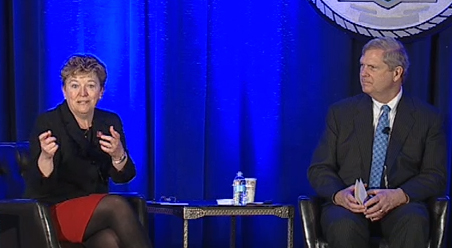Dean Boor addresses future of agriculture at USDA event
By Krishna Ramanujan

Kathryn Boor, the Ronald P. Lynch Dean of the College of Agriculture and Life Sciences, outlined three key issues land-grant universities and colleges must address with regard to the future of agriculture.
They are: “the need for partnerships for transformative research, the need to draw an entirely new group of people into agriculture who are excited about careers in agriculture and the need to work more closely with our public.”
She made these recommendations during a plenary panel discussion at the United States Department of Agriculture’s 92nd Annual Agricultural Outlook Forum, “Transforming Agriculture, Blending Technology and Tradition,” Feb. 25 in Arlington, Virginia. The panel, “Providing Leadership for Present and Future Generations in the Transformation of Agriculture,” was moderated by Secretary of Agriculture Tom Vilsack.
“Number one is our need to develop even stronger platforms for transformative research as we look to the future,” Boor said. She said as the world faces feeding a projected 9.7 billion people by 2050, farmers will need to produce more food with fewer resources and under volatile conditions. Achieving this will require “transformative research” made possible through partnerships among universities, government, private industry and foundations, she said.
Also, it will be important to develop an agricultural workforce to succeed the current generation of farmers. Boor said the age of the average New York state farmer is 55.
“Simultaneously, we need to address the national shortage of those with college-level or higher education who are excited about careers in agriculture,” she said. Educators must start developing interest from students starting in elementary school, from urban as well as rural areas, she added. Attention must also be given to nontraditional audiences, including veterans, refugees from rural backgrounds, migrant farm workers and women, Boor said.
She cited as an example Cornell trustee John Noble ’76, president of Noblehurst Farms, who is collaborating with Cornell Cooperative Extension to train and employ refugees from the Himalayan kingdom of Bhutan at dairy farms in western New York. This aids society by “helping our refugees adjust with dignity to life in their new community” and by improving the health and robustness of the agricultural sector, Boor said.
She also said Cornell and other land-grant universities and higher learning institutions need to “partner with a sometimes-skeptical public to convince our citizens of the need for innovation in our agricultural and food systems.”
While Boor remains optimistic farmers will meet the global demands for food, she cautioned this will require “expanding our toolkit to more rapidly produce plant varieties that have enhanced nutritional characteristics and that have different sorts of agronomic characteristics,” while also providing technologies required to accelerate the process of plant breeding.
Other panelists included Ilene Gordon, CEO of Ingredion, a $6 billion global ingredients solutions company that makes starches and sugars available to pharmaceutical, paper and food processing companies; Pamela Hess, executive director of the Arcadia Center for Sustainable Food and Agriculture; and Pam Johnson, a farmer and former president of the National Corn Growers Association.
Boor is an inaugural member of the board of directors for the newly launched Foundation for Food and Agricultural Research (FFAR), which uses public and private resources to increase scientific and technological research, innovation and partnerships to boost the U.S. agricultural economy.
Media Contact
Get Cornell news delivered right to your inbox.
Subscribe